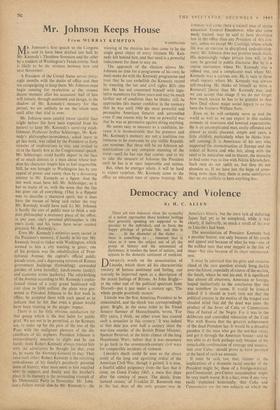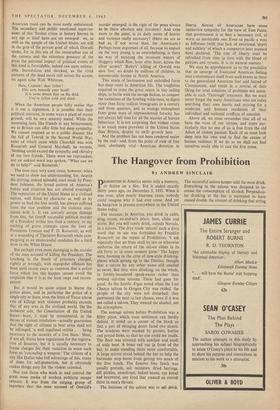Democracy and Violence
By H. C. ALLEN There are rare instances when the sympathy of a nation approaches those tenderer feelings that generally speaking are suppoged to be peculiar to the individual, and to form the happy privilege of private life; and this is one. . . . In the character of the victim . . . there is something so . . . innocent that it takes as it were the subject out of all the pomp of history and the ceremonial of diplomacy; it touches the heart of nations, and appeals to the domestic sentiment of mankind. a DISRAELI'S words on the assassination of Lincoln, which show all his characteristic mastery of human sentiment and feeling, can scarcely be improved upon as a description of the recent feelings of Britons. As John Bright— at the other end of the political spectrum from Disraeli—put it just under a century ago, The whole people positively mourn.'
Lincoln was the first American President to be assassinated, and the shock was correspondingly great. Bright, in the same letter to his friend Senator Sumner of Massachusetts, wrote. 'For fifty years, I think, no other event has created such a sensation in this country.' It was indeed at that date just over half a century since the war-time murder of the British Prime Minister, Spencer Perceval, at the bitter climax of the long Napoleonic Wars; before that it was necessary to go back to the seventeenth-century civil wars for comparable incidents of violence.
Lincoln's death could be seen as the direct result of the long and agonising ordeal of the American Civil War, though it gained, it is true, a fearful added poignancy from the fact that it came, on Good Friday 1865, a mere five days after the coming of peace. The death, from 'natural causes,' of Franklin D. Roosevelt was in the last days of the only greater war in
./imerica's history, but the stern task of defeating Japan had yet to be completed, while it was clearly, if indirectly, as much a result of the war as Lincoln's had been.
The assassination of President Kennedy had a peculiar horror, not only because of his youth and appeal and because of what he was—one of the noblest men that ever stepped in the tide of times—but also because of its sheer unexpected- ness.
It must be admitted that the grim and ominous cloud of the race question already hung darkly over the future, especially of course of the section, the South, where he met his end. It is significant that almost all observers, American or foreign, leaped instinctively to the conclusion that this was somehow its cause. It would be ironical indeed if it should in truth turn out that the political content in the motive of the warped and clouded mind that did the deed was more the product of the fever of Cuba or Communism than of hatred of the Negro. For it was in the deliberate and controlled relaxation of the Cold War with Russia that the greatest achievement of the dead President lay. It would be a dreadful paradox if the man who got the test-ban treaty and got it through the American Senate--and he was able to do both perhaps only because of his remarkable combination of courage and modera- tion over Cuba--should proVe to have perished at the hand of such an assassin.
It must be said, too, that, sinister as the implications of a domestic racial murder of the President might be, those of a foreign-oriented, pro-Communist, pro-Castro assassination might be very much worse. It is a fact, even if one very easily explained historically, that Cuba and Communism are the two subjects on which the
American mind can be most easily unbalanced. The secondary and public emotional repercus- sions of this 'foulest crime in history known in any age or land' have not yet emerged: we, as well as the people of the United States, are still in the grip of the private grief of which Disraeli spoke, for in this era of the remorseless eye of the camera and the relentless pressure of the press the personal impact of political events of this kind is formidable, indeed can seem unbear- able. Incredulous and shocked, as the vivid pictures of the dead move still across the screen, we again echo Walt Whitman,
Here, Captain! dear father!
This arm beneath your head!
It is some dream that on the deck You've fallen cold and dead.
When the American people fully realise that it is not a nightmare, it is possible that their political restraint, in some ways a plant of recent growth, will be very severely tested. While the mourning lasts, like friends in any bereavement, we in Britain can offer little but deep sympathy. We cannot respond as to a public disaster like the fall of Tobruk in the Second World War, news of which came while Churchill was with Roosevelt and General Marshall; he records, `Nothing could exceed the sympathy and chivalry of my two friends. There were no reproaches; not an unkind word was spoken. "What can we do to help?" said Roosevelt.'
The time may very soon come, however, when we need to show our understanding, for, despite the stirring, indeed splendid, start made by Presi- dent Johnson, the broad pattern of America's habits and situation has not altered overnight. The reputation of the United States as a civilised nation, well fitted by character as well as by power to lead the free world, has always suffered from the race problem and the violence asso- ciated with it. It can scarcely escape damage from this, the fourth successful political murder of a President within less than a century, to say nothing of grave attempts upon the lives of Presidents Truman and F. D. Roosevelt, as well as a wounding of Theodore Roosevelt while cam- paigning as an unsuccessful candidate for a third term in the White House.
But perhaps even more damaging is the murder of the man accused of killing the President. The lynching in the South of prisoners charged, rightly or wrongly,' with unpopular offences has been until recent years so common that a police force which lets this happen cannot avoid the suspicion that it is at the least inept and incom- petent.
But it would be quite unjust to blame the police alone, and in particular the police of a single city or State, even the State of Texas whose rate of killings with violence probably exceeds that of any area in the civilised world. On the technical side, the Constitution of the United States—born, it must be remembered, in the throes of violent revolution—actually guarantees that the right of citizens to bear arms shall not be infringed, 'a well regulated militia . . . being necessary to the security of a free State.' Most, if not all, States have regulations for the registra- tion of firearms, but it is wally necessary to frame charges for their violation, in some such form as 'concealing a weapon.' The citizens of a city like Dallas take full advantage of this, many of them for self-protection, but it obviously makes things easy for the violent criminal.
Nor can those who work in and control the great mass media of modern publicity escape censure. It was from the surging group of reporters that the man accused of Oswald's
murder emerged; is the right of the press always to be there absolute and inviolate? And even more to the point, is its daily menu of horror and violence really necessary? (Here we are as bad as, if not worse than, the Americans.) Perhaps most important of all, because its impact on the very young is so overwhelming, is there no way of escaping the incessant waters of thuggery which flow, hour after hour, across the silver screen? 'Ruby's' killing of Oswald was seen 'live,' no doubt by millions of children, in innumerable homes in North America.
This strain of lawlessness and unbridled force has deep roots in American life. The toughness required to cross the great ocean in tiny sailing ships, to battle with the savage Indian, to conquer the vastnesses of the howling wilderness, to digest more than forty million immigrants in a century and three quarters, and to emerge triumphant from great wars of unprecedented ferocity has not always left time for all the niceties of human behaviour. It is not surprising that violent crime is so much more prevalent in the United States than Britain, despite its swift growth here.
And the problem has not been rendered easier by the real—and, from the point of view of free man, absolutely vital—American devotion to liberty. Almost all Americans have some instinctive sympathy for the view of Tom Paine, that government is at best a necessary evil, at worst an intolerable one. Even so pacific a man as Jefferson (with that lack of emotional 'depth and subtlety' of which a compatriot later accused him) declared, The tree of liberty must be refreshed from time to time with the blood of patriots and tyrants. It is its natural manure.'
We may be apprehensive as to the possibility that an upsurge of frustrated American feeling may communicate itself from such events as these to the generalised American fear and hatred of Communism, and result in a revival of their liking for total solutions of problems not amen- able to such 'Thorough' treatment. But we must never forget the many Americans who are today searching their own hearts and striving for a moderate and humane resolution of their individual and national conflicts of emotion.
Above all, we must remember that all of us have the vices of our virtues, and more par- ticularly that no one of us is free from the old Adam of violent passion. Each of us must look deep into his own soul to find the causes of human violence. if we do so we shall not find ourselves easily able to cast the first stone.







































 Previous page
Previous page